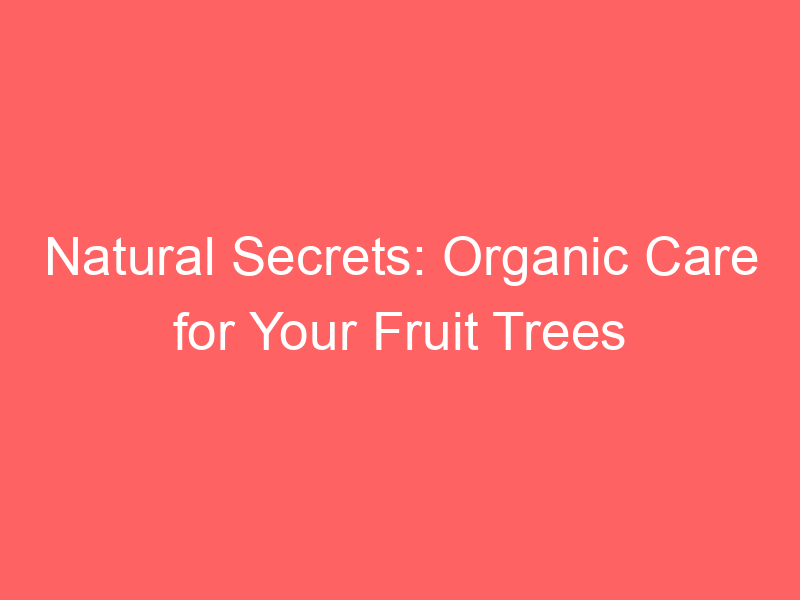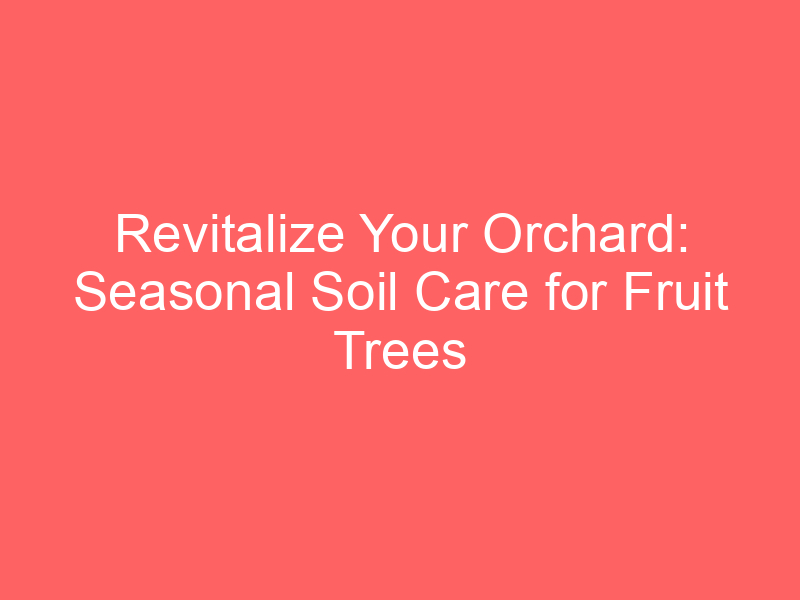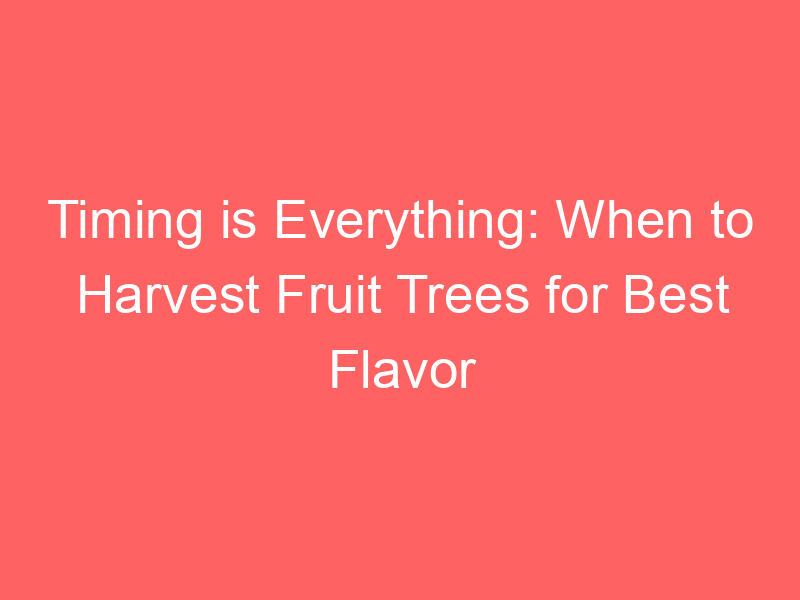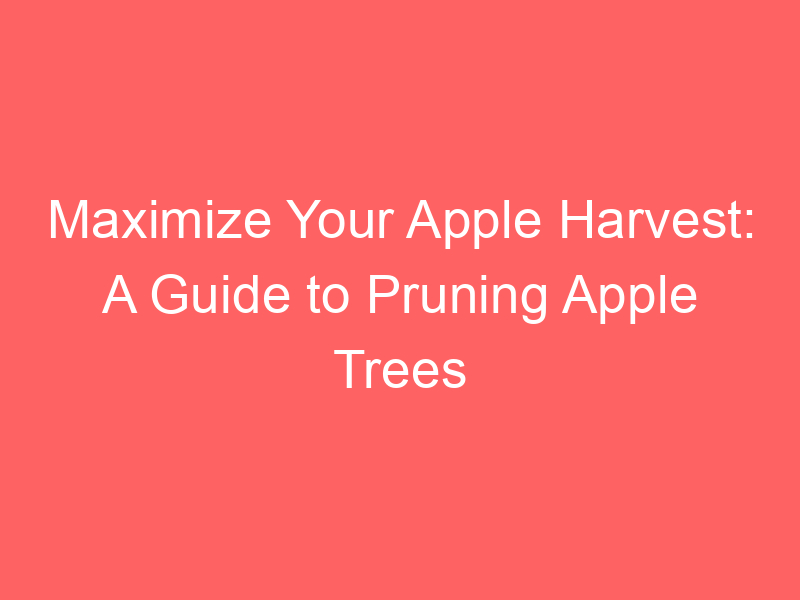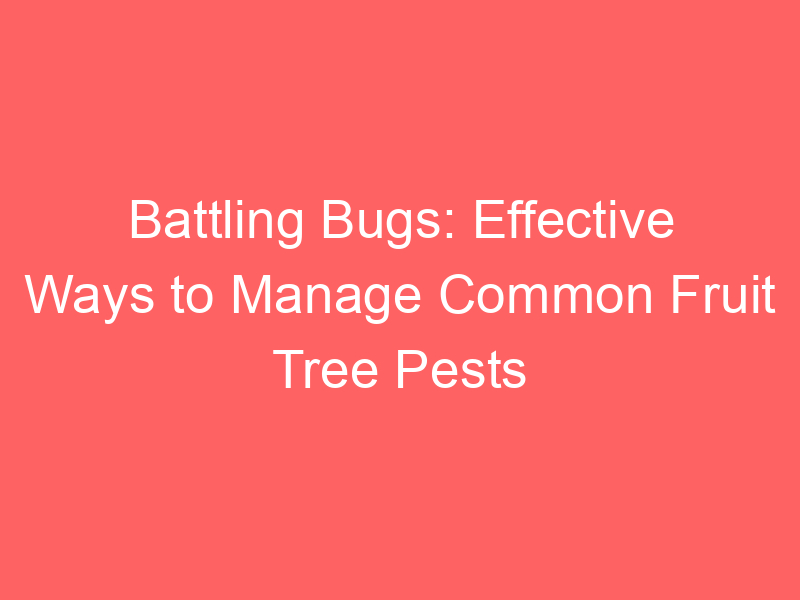Introduction to Organic Fruit Tree Care
As a plant lover, you understand the joy of harvesting fresh, juicy fruits right from your backyard. But have you ever considered the methods you use to care for your fruit trees? Let’s delve into the world of organic fruit tree care and discover why it’s essential for your home orchard.
- Understanding the Importance of Organic Tree Care
- Benefits of Organic Methods for Tree Health
Organic tree care is all about nurturing your fruit trees in a natural, chemical-free way. It’s about creating a healthy environment where your trees can thrive without the use of synthetic fertilizers or pesticides. This method not only ensures the health of your trees but also contributes to the well-being of the environment. According to a Wikipedia article on organic farming, organic methods can help reduce pollution, conserve water, reduce soil erosion, increase soil fertility, and use less energy.
Organic tree care has numerous benefits for your fruit trees. For starters, it helps maintain the soil’s health, which is crucial for the tree’s growth and fruit production. Organic methods also promote biodiversity, encouraging beneficial insects and microorganisms that help control pests and diseases. Moreover, fruits grown organically are often more nutritious and tastier, as confirmed by a Wikipedia article on organic food. So, by going organic, you’re not just caring for your trees but also ensuring the best quality fruits for your family.
In the following sections, we’ll explore more about the essential elements of organic fruit tree maintenance, organic pest control, organic fertilization methods, and eco-friendly fruit tree methods. So, stay tuned and get ready to transform your home orchard into a thriving, organic paradise.
Essential Elements of Organic Fruit Tree Maintenance
One of the key elements in maintaining a healthy and productive organic fruit tree is the health of the soil in which it grows. Soil health is the foundation of a successful organic fruit tree care. Let’s delve deeper into this topic.
Soil Health
Soil health is a crucial factor in organic fruit tree care. It not only provides the necessary nutrients for the tree but also supports the overall ecosystem around the tree. Healthy soil is teeming with beneficial microorganisms that help in nutrient cycling, improving soil structure, and protecting the tree from diseases.
- Importance of soil health in organic fruit tree care
- Natural methods to improve soil health
Healthy soil is the backbone of any organic garden, especially when it comes to fruit trees. The health of the soil directly affects the health and productivity of the fruit tree. A healthy soil provides all the necessary nutrients that a fruit tree needs to grow and produce fruit. It also helps in water retention and drainage, preventing water-logging and drought stress. Healthy soil is also rich in beneficial microorganisms that help in nutrient cycling and disease prevention. According to a Wikipedia article, soil health is the capacity of the soil to function as a living system.
There are several natural methods to improve soil health. These include composting, mulching, and crop rotation. Composting involves adding organic matter to the soil, which improves its structure and nutrient content. Mulching helps in retaining soil moisture and preventing weed growth. Crop rotation, on the other hand, helps in breaking the disease cycle and improving soil fertility. Other methods include the use of green manures and cover crops, which help in adding nutrients to the soil and improving its structure.
By focusing on soil health, you can ensure that your fruit trees are healthy, productive, and resilient to pests and diseases. Remember, a healthy soil equals a healthy tree!
Watering Techniques
Watering is a crucial aspect of organic fruit tree maintenance. It’s not just about providing water, but doing so in a way that’s sustainable and beneficial for the tree’s health. Let’s explore some effective watering techniques.
- Sustainable Watering Practices for Fruit Trees
- How to Avoid Overwatering and Underwatering
Adopting sustainable watering practices is not only good for your fruit trees but also for the environment. One such practice is the use of a drip irrigation system. This method ensures that water is delivered directly to the tree’s root zone, reducing water wastage and promoting deeper root growth. Another sustainable practice is to water early in the morning or late in the evening to minimize evaporation. Collecting rainwater is also a great way to conserve water and provide your trees with natural, untreated water.
Both overwatering and underwatering can harm your fruit trees. Overwatering can lead to root rot, while underwatering can cause the tree to become dehydrated and stressed. The key is to find a balance. A good rule of thumb is to water deeply but infrequently. This encourages the tree to develop deep roots, making it more drought-tolerant. You can also check the soil moisture levels regularly. If the top 2-3 inches of soil are dry, it’s time to water. If they’re wet, wait a bit longer.
Remember, every tree is different and may have specific watering needs. Always monitor your trees closely and adjust your watering practices as needed. With the right techniques, you can ensure your fruit trees are healthy and productive.
Pruning and Training
- Why pruning is essential in maintaining organic fruit trees
- Organic tree care techniques for effective pruning
- Timing: The best time to prune most fruit trees is during late winter or early spring when the tree is dormant and before new growth starts.
- Tools: Use sharp, clean pruning tools to make clean cuts and prevent the spread of disease.
- Technique: Always prune above a bud facing the direction you want that branch to grow in the future. This helps to control the shape and spread of the tree.
- Amount: Don’t remove more than 25% of the tree’s canopy in a single year as it can stress the tree.
Pruning is a crucial aspect of organic fruit tree care. It helps in maintaining the health and productivity of the tree. When we prune, we remove dead, diseased, or damaged branches, allowing the tree to focus its energy and resources on producing healthy fruits. According to a Wikipedia article, pruning also helps in shaping the tree and improving its structure, which can prevent potential damage from heavy fruits or strong winds. It also allows more sunlight to reach the inner parts of the tree, promoting better growth and fruit production.
Effective pruning requires understanding the tree’s growth patterns and needs. Here are some organic tree care techniques for effective pruning:
Remember, the goal of pruning is to keep the tree healthy and improve fruit production. It’s a skill that takes time to master, but with patience and practice, you can maintain your organic fruit trees effectively.
Organic Pest Control for Fruit Trees
One of the most significant challenges in maintaining a healthy fruit tree is dealing with pests. However, it’s possible to manage these pests organically, without resorting to harmful chemicals. Let’s explore some natural methods and a case study on successful organic pest control techniques.
- Natural methods for managing pests
- Companion Planting: Some plants naturally repel certain pests. Planting these alongside your fruit trees can help keep pests at bay. For example, marigolds are known to deter nematodes and aphids.
- Beneficial Insects: Not all insects are harmful. Some, like ladybugs and lacewings, prey on pests. Encouraging these beneficial insects can naturally control pest populations.
- Homemade Sprays: You can make organic sprays using ingredients like garlic, hot pepper, or neem oil. These sprays can deter pests without harming your trees or the environment.
- Case study: Successful organic pest control techniques
There are several natural methods that can help you manage pests effectively. These methods are not only safe for the environment but also beneficial for the overall health of your fruit trees. Here are a few:
Let’s take a look at a real-life example of successful organic pest control. A study conducted by the Rodale Institute found that organic apple orchards had similar yields to conventional orchards, but with fewer pests and higher biodiversity.
The organic orchards used techniques like composting, cover cropping, and encouraging beneficial insects. They also used organic sprays made from vinegar and water. The result was a successful harvest with fewer pests and a healthier ecosystem.
In conclusion, organic pest control is not only possible but can also be highly effective. By using natural methods and learning from successful case studies, you can protect your fruit trees and enjoy a bountiful harvest.
Organic Fertilization Methods
One of the most important aspects of organic fruit tree care is fertilization. It’s a natural way to provide your trees with the nutrients they need to thrive. One of the most effective organic fertilization methods is composting.
Composting
Composting is a process that turns organic waste into nutrient-rich soil. It’s a fantastic way to recycle kitchen and garden waste, and it’s beneficial for your fruit trees too. Let’s delve into how composting contributes to organic fruit tree care and how to create your own compost pile.
- How composting contributes to organic fruit tree care
- Steps to create your own compost pile
- Choose a suitable location: Pick a spot in your garden that’s easily accessible and has good drainage.
- Start your compost pile: Start with a layer of brown materials like leaves, branches, or straw for carbon, then add a layer of green materials like vegetable scraps, coffee grounds, or grass clippings for nitrogen. Add a thin layer of soil to introduce microorganisms that will help break down the materials.
- Turn the compost pile: Turn your compost pile every few weeks with a pitchfork or shovel to help aerate it and speed up the composting process.
- Use your compost: Once your compost pile has turned into a rich, dark soil, it’s ready to use. Spread it around the base of your fruit trees to provide them with a nutrient boost.
Composting is a natural process that enriches the soil, providing a nutrient-dense environment for your fruit trees. The compost acts as a slow-releasing fertilizer, supplying essential nutrients to your trees over time. It also improves soil structure, enhancing its ability to hold water and air, which are vital for tree growth. According to a Wikipedia study, compost can increase the yield of fruit trees by up to 50%.
Creating your own compost pile is a simple and cost-effective way to provide organic fertilizer for your fruit trees. Here are the steps:
Composting is a fantastic organic fertilization method that not only benefits your fruit trees but also contributes to a healthier environment by reducing waste. So why not start your compost pile today?
Green Manures and Cover Crops
Green manures and cover crops are essential tools in organic fruit tree maintenance. They offer numerous benefits and play a significant role in maintaining soil health. Let’s explore these in detail.
- Benefits of Green Manures in Organic Fruit Tree Maintenance
Green manures are plants that are grown and then plowed back into the soil. They are a natural way to add nutrients to the soil, which is essential for healthy fruit tree growth. Here are some key benefits:
- Nutrient Boost: Green manures like clover, alfalfa, and vetch are rich in nitrogen, a nutrient that fruit trees need to grow strong and healthy. When these plants decompose, they release nitrogen into the soil.
- Soil Structure: The roots of green manures help to break up hard soil, improving its structure and making it easier for fruit tree roots to penetrate.
- Weed Control: Green manures grow quickly and densely, helping to suppress weeds that can compete with fruit trees for nutrients.
- Pest Control: Some green manures, like mustard, have natural pest-repelling properties, helping to protect fruit trees from harmful insects.
- How to Use Cover Crops for Soil Health
Cover crops, like rye, oats, and clover, are planted to cover the soil surface. They protect the soil from erosion, improve its structure, and add organic matter. Here’s how to use them:
- Choose the Right Cover Crop: Different cover crops offer different benefits. For example, rye helps to prevent soil erosion, while clover adds nitrogen to the soil. Choose the one that best suits your soil’s needs.
- Planting: Cover crops are usually planted in the fall, after the fruit trees have been harvested. They grow over the winter, protecting the soil and adding nutrients.
- Turning Under: In the spring, before the cover crop starts to seed, it should be turned under the soil. This allows it to decompose and release its nutrients into the soil.
By using green manures and cover crops, you can maintain soil health and ensure a bountiful harvest from your fruit trees. Remember, a healthy soil leads to healthy, productive trees.
Eco-friendly Fruit Tree Methods
When it comes to fruit tree care, it’s essential to consider the environment. By adopting eco-friendly practices, we can ensure the health of our trees while also preserving the planet. Here are some sustainable methods and key takeaways for green gardening.
- Practices for sustainable fruit tree care
- Water Conservation: Overwatering is not only wasteful but can also harm your trees. Use a soaker hose or drip irrigation system to deliver water directly to the roots, reducing evaporation and runoff.
- Organic Fertilizers: Instead of synthetic fertilizers, opt for organic ones. Compost, manure, and bone meal are all excellent options that enrich the soil without harming the environment. Learn more about organic fertilizers here.
- Natural Pest Control: Pesticides can be harmful to both the environment and beneficial insects. Use natural methods like introducing predatory insects, using barriers, or planting companion plants.
- Key takeaways on eco-friendly gardening
- Every Action Counts: Even small changes can make a big difference. Start with one eco-friendly practice and gradually incorporate more.
- Patience is Key: Organic and sustainable gardening methods may take longer to show results, but they are more beneficial in the long run.
- Education is Essential: Stay informed about the latest eco-friendly practices and continue learning. The more you know, the more effective your gardening will be.
There are several ways to care for your fruit trees sustainably. These include:
Eco-friendly gardening is not just about the practices you adopt, but also the mindset you have. Here are some key takeaways:
In conclusion, eco-friendly fruit tree care is a rewarding practice that benefits both your garden and the planet. By adopting sustainable methods and maintaining an eco-conscious mindset, you can enjoy a bountiful harvest while also doing your part for the environment.
Conclusion: The Future of Organic Gardening
As we wrap up our discussion on organic fruit tree care, it’s important to look ahead and consider the future of gardening. With the increasing awareness about the importance of sustainability and the harmful effects of synthetic chemicals, organic gardening is set to become the norm rather than the exception.
-
Why Organic Fruit Tree Care is the Future of Gardening
Organic fruit tree care is more than just a trend; it’s a sustainable approach to gardening that respects the environment and promotes healthier produce. The use of natural pest control methods and organic fertilizers not only reduces the exposure of our soil, water, and air to harmful chemicals, but it also helps to preserve the biodiversity of our ecosystems.
According to a Wikipedia article, the organic food market has been growing steadily, indicating a shift in consumer preferences towards healthier and more sustainable options. This trend is likely to continue, making organic fruit tree care an essential skill for any gardener.
-
Final Thoughts on Organic Gardening Tips
Organic gardening requires patience, knowledge, and a deep respect for nature. It’s about understanding the needs of your fruit trees and providing them with the best possible care using natural methods. It may be more challenging than conventional gardening, but the rewards are well worth the effort.
Remember, every small step towards organic gardening contributes to a healthier environment and a safer future for the next generations. So, let’s embrace organic fruit tree care and make our gardens a haven for nature.

